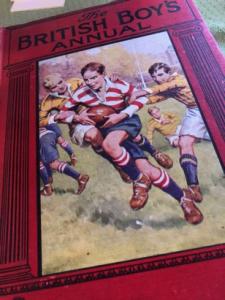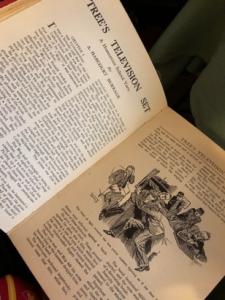 Screens have changed a good bit, often for the better. This information is (almost surely) coming to you through a screen. My Bible study today came courtesy of Olive Tree, and could shift quickly from a text on the Hapsburg family to one on George B. McClellan thanks to screen time.
Screens have changed a good bit, often for the better. This information is (almost surely) coming to you through a screen. My Bible study today came courtesy of Olive Tree, and could shift quickly from a text on the Hapsburg family to one on George B. McClellan thanks to screen time.
Bravo for screens!
And yet this pandemic has reminded me that too much of a good thing, even for excellent reasons, is too much. If we assume that there is nothing particularly harmful in screen use (no moral panic here!), then too much is simply one good thing crowding out other good things. The time spent on the screen might be jolly good fun, but that is time not spent writing a novel, painting a room, planting a garden, running, learning to cook a lemon tart, or identifying the stars in the night sky.
Variety is good for the soul.
Meanwhile, back to the British Boy’s Annual. This hardcover annual is a good sign that some things about the world are worse and some better. The stories are not. . . Shakespeare. . . Rogues of the Rolling Main, a swashbuckler is not even Pericles let alone Hamlet, yet the vocabulary and sentence sophistication is very high compared to books for young adults today. Some of the values taught (and values are pounded home) are very good. We are all glad that in 1931 Pete Sees it Through. However, the imperialism and the straight up racism in Out of China cannot be justified. Problems and all, you should know Percy Westerman who mastered the Indiana Jones adventure long before Indy.
Screens, particular television screens (small, frosted) are fascinating to the British Boys that were the target market of the 1931 annual. If you had a television set sent to you at the Old School, then everyone from masters to the well-liked boys would crowd into your room. Imagine a wireless, but with a motion picture front. If you got one of these, then you would be at the bleeding edge of technology. You might become popular and have good fun. None of this works out for the “fat boy” Tree (the story calls him this) who is the recipient of a television.
 Of course not. He is fat, greedy, and comic. The whole thing is a joke played on him by his athletic, thin, younger brother. Such larks!
Of course not. He is fat, greedy, and comic. The whole thing is a joke played on him by his athletic, thin, younger brother. Such larks!
And yet the fascination with the television in the story is one piece with the longing for skyscrapers, cathedrals build for commerce and “knowledge and not the Deity” found in the not-so-gripping article Weird Buildings of the Modern World. The unfinished Empire State Building is one of those weird buildings . . . which would include an ability to dock airships. These are defended in the British Boy’s Annual in Airways of the Future despite a recent crash of the R101, after all the loss of RMS Titanic did not end passenger liners. How could it get worse than the R101?
The television, the skyscraper, the airships might all have had downsides, but the British Boy’s Annual hardly can see one. The technology is the thing that captures the imagination of the boys. Science has given us airships and planes, so airships and planes we must have. Television exists, so television we must have. We can build cities that are jammed up, crowding out any vision of the stars, but neon will replace the stars.
What could go wrong?
A good read of 1931 was a reminder that smart opinion is disastrously wrong if it conflates “science” with elite opinion about what to do with science. In 1931 in the British Boy’s Annual, the whole of Christian morality is forgotten as airplanes will allow us to knit together a dubious Empire. Do you think these Imperial airways troubling? Are you arguing with science?
Television exists, and I am thankful, but I need not watch television or signup for this particular streaming service. I can choose rugby over reruns. That we can do a thing, does not mean we should do a thing. Nobody told the British Boy’s Annual you can mock the fat boy, but a fully Christian gentleman would not do so. Science (of 1931) will back eugenics and racism, but a Christian must go on thinking all people are of one blood and flesh.
Tree’s television, British airships, weird skyscrapers are all dated now. . . quaint where not condemned, but the old lie remains: what we can make, we must use as much as possible in any manner pleasing to us.
No.
God forbid.












